

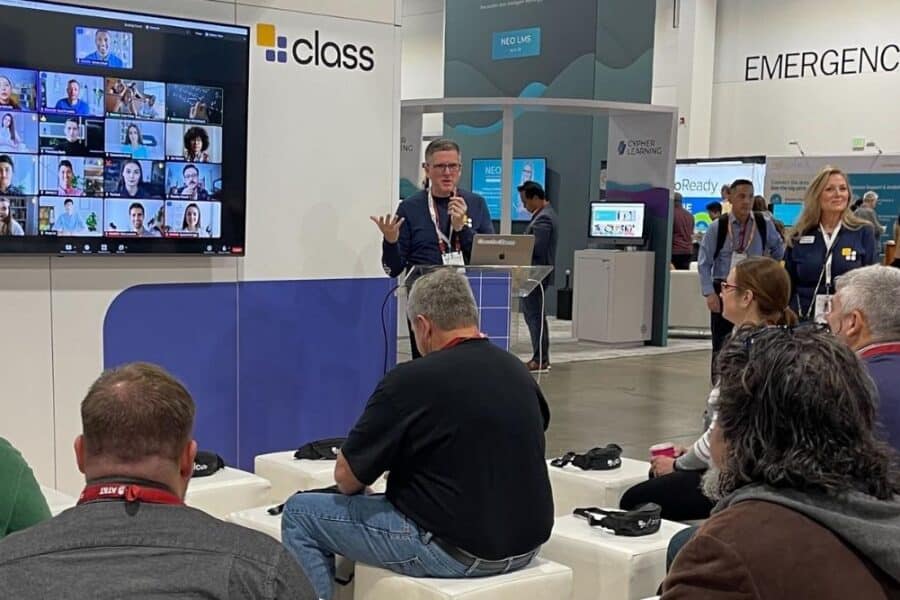
In this blog post, read what Class learned at EDUCAUSE 2022, including takeaways from the conference framing the future of online learning.
Last week, Class met up in Denver to attend EDUCAUSE 2022. Our days were packed with wall-to-wall activities. We caught up with our current Class and Class Collaborate users, met new Class fans, and connected with administrators worldwide. Over three days, we hosted receptions, led breakout sessions, facilitated a workshop with Zoom partners, and highlighted the best Class at our booth.
As our team heads back home to recoup and evaluate our incredible week, we reflected on major takeaways from the conference.
In this blog post, read what Class learned at EDUCAUSE 2022, including takeaways from the conference framing the future of online learning.
Last week, Class met up in Denver to attend EDUCAUSE 2022. Our days were packed with wall-to-wall activities. We caught up with our current Class and Class Collaborate users, met new Class fans, and connected with administrators worldwide. Over three days, we hosted receptions, led breakout sessions, facilitated a workshop with Zoom partners, and highlighted the best Class at our booth.
As our team heads back home to recoup and evaluate our incredible week, we reflected on major takeaways from the conference.
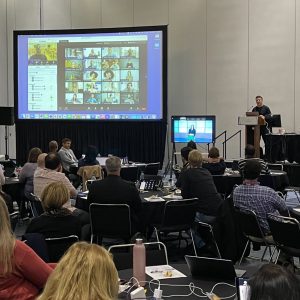
Class CEO and Founder, Michael Chasen, gives a demo of the Class platform
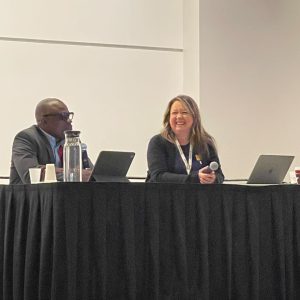
Dr. Kim Oppelt (Class) and Dr. Erasmus Addae (Austin Community College) co-present during a session
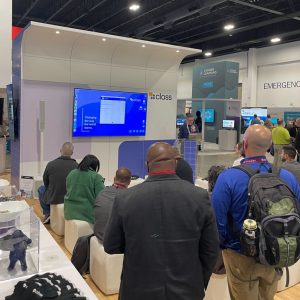
EDUCAUSE 2022 attendees watch a live demo at the Class booth
How we deliver education is changing, but one thing that will stay the same is the need for students and instructors to make meaningful connections.
This theme constantly arose from our workshop Designing Programs and Utilizing Technology to Meet 21st Century Distance Education Guidelines. Now, more than ever, students expect institutions to care about them. The days of “come in, sit down, and be lectured” are over.
We are in the era of engagement. More engagement from students–with the subject matter, the instructor, or each other–makes for more meaningful education.
Equity is front of mind regarding access to quality education. And the most important feedback comes from students.
Instructors, administrators, and campus leaders are listening and learning, figuring out how to meet the needs of all learners. That doesn’t mean the same thing works for everyone.
For example, we no longer look at higher education in a term of four to five years; we now look at it as a 60-year curriculum. That means providing lifelong learning opportunities for diverse students with micro-credentialing and programs focused on upskilling their interests for the workforce.
So, how can we create an educational experience that fits the standards and needs of a growing and diverse student population? What does that look like? Hint: one size does not fit all.
Throughout the weekly sessions, the question of how to prepare faculty for online teaching came up frequently.
The answer was straightforward through our conversations and discussions: focus on what faculty already know!
When instructors are proficient in connecting with students, they create habits and routines that build relationships. For example, try saying hello to individual students before a HyFlex course begins. Introduce new skills to develop new habits. Focus on teaching in different environments.
How we deliver education is changing, but one thing that will stay the same is the need for students and instructors to make meaningful connections.
This theme constantly arose from our workshop Designing Programs and Utilizing Technology to Meet 21st Century Distance Education Guidelines. Now, more than ever, students expect institutions to care about them. The days of “come in, sit down, and be lectured” are over.
We are in the era of engagement. More engagement from students–with the subject matter, the instructor, or each other–makes for more meaningful education.
Equity is front of mind regarding access to quality education. And the most important feedback comes from students.
Instructors, administrators, and campus leaders are listening and learning, figuring out how to meet the needs of all learners. That doesn’t mean the same thing works for everyone.
For example, we no longer look at higher education in a term of four to five years; we now look at it as a 60-year curriculum. That means providing lifelong learning opportunities for diverse students with micro-credentialing and programs focused on upskilling their interests for the workforce.
So, how can we create an educational experience that fits the standards and needs of a growing and diverse student population? What does that look like? Hint: one size does not fit all.
Throughout the weekly sessions, the question of how to prepare faculty for online teaching came up frequently.
The answer was straightforward through our conversations and discussions: focus on what faculty already know!
When instructors are proficient in connecting with students, they create habits and routines that build relationships. For example, try saying hello to individual students before a HyFlex course begins. Introduce new skills to develop new habits. Focus on teaching in different environments.


Get our insights, tips, and best practices delivered to your inbox

Sign up for a product demo today to learn how Class’s virtual classroom powers digital transformation at your organization.
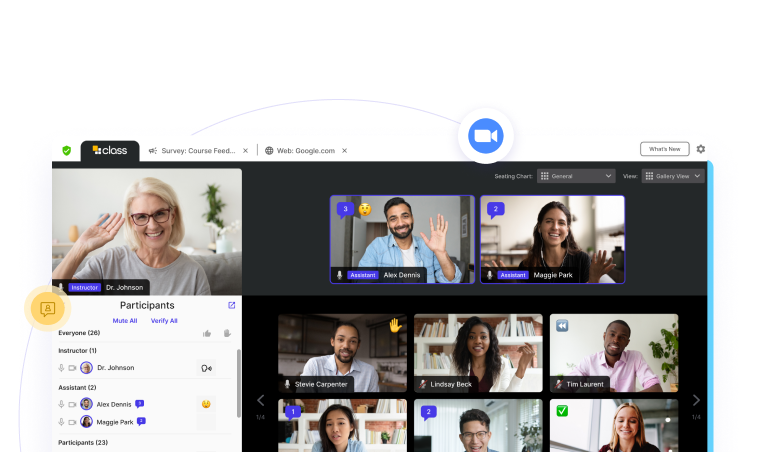
Features
Products
Integrations